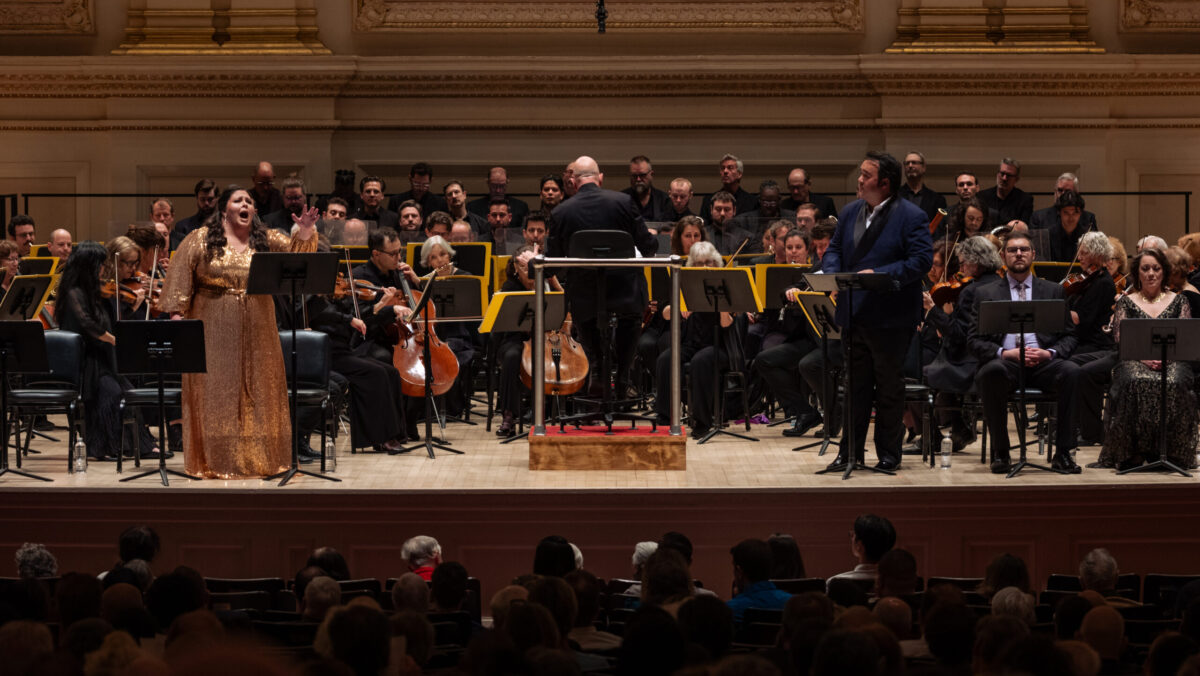
Matt Dine
Richard Strauss was 29 years old when he premiered his first operatic composition, Guntram, in Weimar on May 10, 1894, conducting his own score. Like many other late nineteenth century and early twentieth century composers, he was (briefly) under the spell of Richard Wagner and like the master of Bayreuth, he supplied his own libretto. Strauss had already established himself with orchestral tone poems and Lieder.
The soprano role of Freihild was performed by the singer who became his partner for life, Pauline de Ahna, later Pauline Strauss, of Intermezzo fame/infamy. (Intermezzo being the only other opera for which he supplied his own libretto since it was autobiographical.) Guntram was a moderate success in Weimar, but a later production in Munich was a decided failure. All other productions at that time were canceled. Gustav Mahler, however, admired the work and conducted the orchestral introductions to Acts I and II at Carnegie Hall and in concerts in Vienna.
Strauss took the failure badly and in a dramatic gesture, built a grave for Guntram in his back garden with a marker reading: “Here lies the venerable, virtuous young Guntram – Minnesinger, who was gruesomely slain by the symphony orchestra of his own father. May he rest in peace!”
And so Guntram did rest in peace until 1939-40 when Strauss dusted off the score and made revisions and cuts leading to a 1942 performance in Berlin. That is the only version that is currently available for performance and it was performed at Carnegie Hall on Friday 6 June with Dr. Leon Botstein leading his American Symphony Orchestra. The work had been performed before in New York in its entirety by the Opera Orchestra of New York back in January 1983 with the redoubtable Eve Queler leading Reiner Goldberg, Ilona Tokody, Roger Roloff, Peter Kazaras, and Peter Wimberger. (Mo. Queler attended the concert, looking remarkable for a 95 year old.)
The work, set in 13th century medieval Germany, centers on a male protagonist (unusual for Strauss). Guntram, a Minnesinger and nobleman disguised as a minstrel, is a member of the secret society the “Champions of Love.” (Shades of Lohengrin and Walther von Stolzing.) In the forest setting of Act I, Guntram offers food and help to the fleeing peasants of a failed rebellion against the tyrannical Duke Robert. (Shades of Parsifal). He prevents the Duke’s unhappy wife Freihild, miserable in her marriage, from drowning herself in the nearby lake. The Duke’s hunting party returns finding Guntram and Freihild and, hearing of her rescue by the seeming minstrel, invites Guntram to the castle for the feast.
At the feast in Act II, Guntram is invited to sing and his song begins well with a paean to peace and nature but turns darker when he pointedly denounces warlike tyrants’ creating mass confusion and dismay. (Shades of Tannhäuser Act II!) This, in tandem with a resurgence of the peasant revolt, provokes Duke Robert to a duel with Guntram, who slays the oppressive tyrant.
Act III finds Guntram in the dungeon where Freihild attempts to free him and run off with him since she is wildly in love with him. His Champion of Love comrade, Friedhold, appears and informs him that he must come before the judgment of his peers of the secret order of Champions of Love for the duke’s death. This is where Strauss goes his own way both dramatically and musically. Instead of salvation by the eternal feminine in proper Wagnerian style or condemnation by his peers as per tragic opera tradition, Guntram decides that he will be his own judge and savior. (Shades of Nietzsche.)
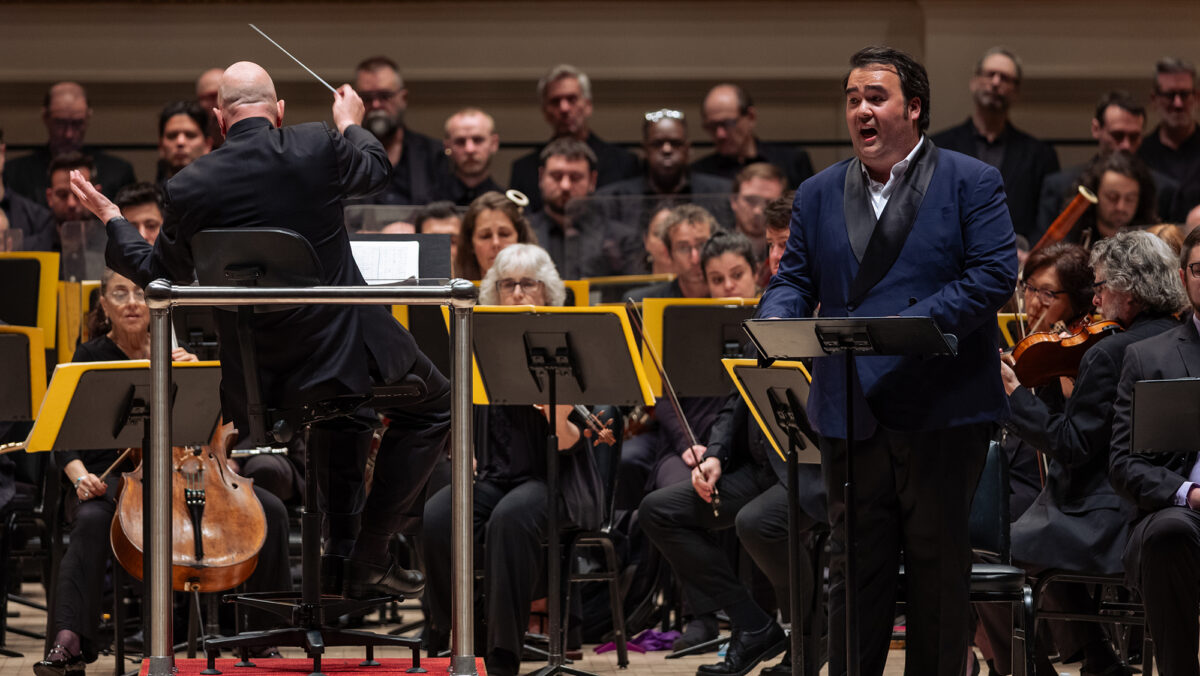
Matt Dine
Guntram claims that though his murder of the duke was in self-defense, it was motivated by his passion for the dead man’s wife, Freihild. Guntram renounces both love and society and goes his own way to redemption through self-sacrifice and helping others. Freihild watches him walk off into the sunset, holding back a diva swoon like Elsa von Brabant. This is not in the Wagnerian hero playbook. Musically, in the solos and duet with Freihild (despite clear references to Tristan und Isolde), the harmonies in Act III sound less Wagnerian but more dissonant like Strauss.
The critical opinion, rejected by Mo. Botstein as uninformed and second-hand, dismisses Guntram as a minor, juvenile Wagnerian pastiche. Dramatically, it has its problems and the characters are more ideas of characters than real flesh-and-blood people. The plot seems arbitrary and lacks dramatic tension. However, it sounds luscious and the orchestration is gorgeous, as befitting the composer who had already created Don Juan and Death and Transfiguration. The vocal writing is effective and shows knowledge of the voice. I don’t know how Guntram would play as music theater, but as a concert experience it is one of decided musical pleasure and discovery. (It also helps that the score is only a little over two hours in length – there isn’t a lot of plot.)
The cast was up to task. The tenor role is long and daunting with a fifteen minute monologue in each Act. (Strauss called Guntram a “gasbag” on later reflection.) The role has several lyrical passages and doesn’t hammer at the upper break of the tenor voice in loud declamation like the Kaiser, Bacchus, Apollo, and Midas which are voice breakers. The American tenor John Matthew Myers did an admirable job deploying a plangent, sweetly rounded tone which could rise to ringing climaxes, but he sensibly sang in a lyrical mode throughout, never barking or shouting. Myers rarely looked at his score and sang with unerring musical taste. Myers also performs Schubert in recital which shows in his sensitivity and suave vocalism.
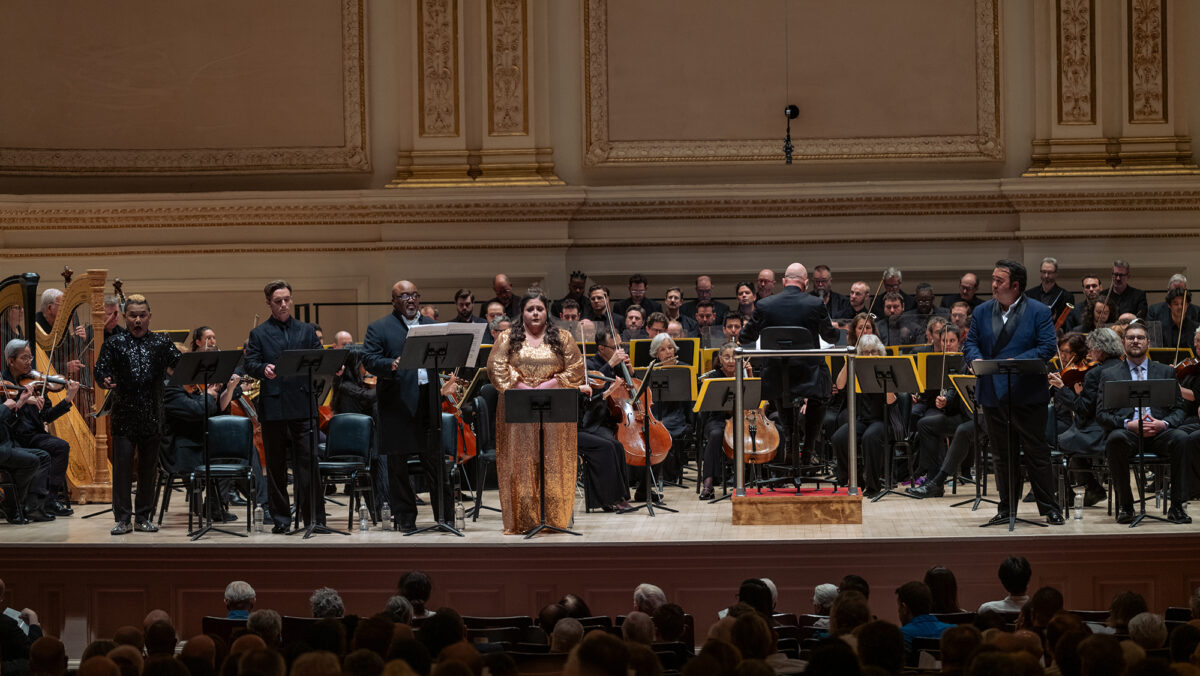
Matt Dine
Myers’s wife, the protean soprano Angela Meade, poured out radiant vocal climaxes. As a current and erstwhile bel canto soprano, I was unsurprised by the refulgence and ease at the top of her range, but the core power and stamina were a new and welcome surprise. (Meade recently added Chrysothemis in Elektra to her repertory with success.) Meade generally chose a stentorian mode of delivery which worked, but there are pianissimo dynamics available which would have given her performance more variety and vulnerability. Her projection of the text was generalized and opaque.
What was more disappointing was Meade’s dour and uninvolved stage demeanor – she mostly slouched over her score, never looking or reacting to her husband as Guntram or to any other stage partner, and had a blank, efficient manner suggesting a secretary dutifully executing a difficult assignment. However, friends commented afterwards that they hear an Isolde in Meade’s voice. After hearing her, I agree but she needs to improve her onstage manner in that (and any other) diva role. I hear a prima donna but don’t see one – despite the gold sequined gown, there was no inner radiance.
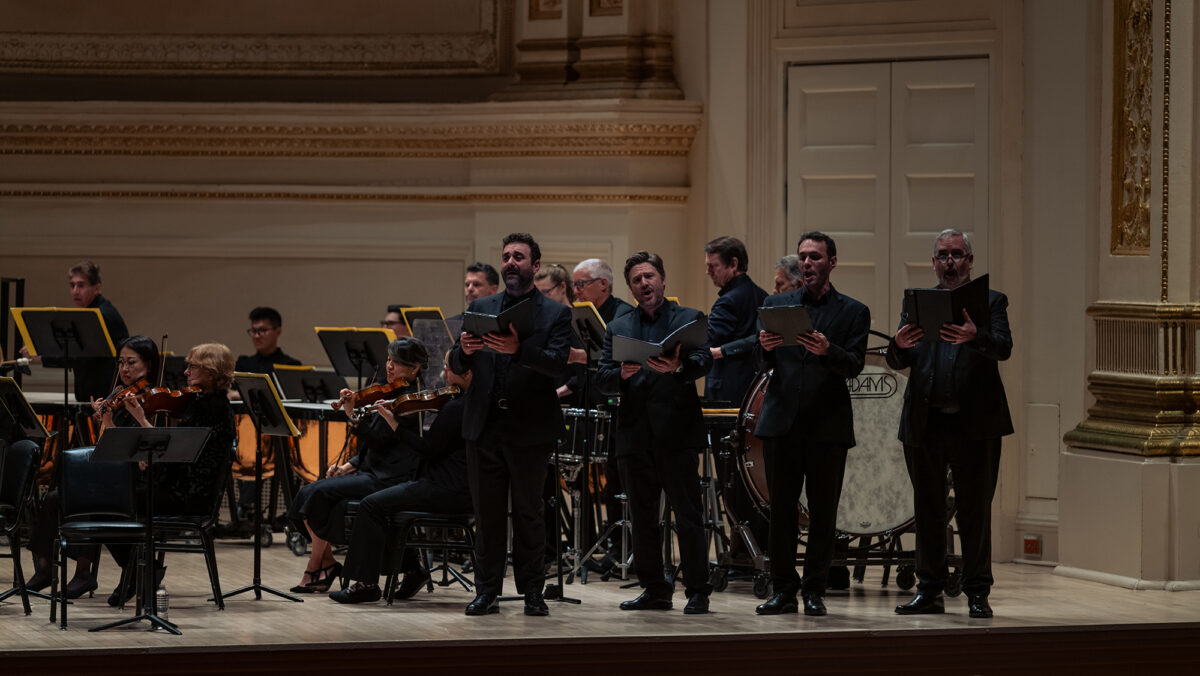
Matt Dine
The rest of the cast fulfilled assignments which had little musical reward but demanded a lot from the singer. Kevin Short was appropriately mellow and sonorous as the humane Old Duke despite some tonal wear and imprecise rhythm. Rodell Rosel stood out for his silver sequined black jacket and rhinestone studded dress shoes as well as his incisive characterful spieltenor as the Jester. As Friedhold, Nate Mattingly stepped in at short notice for the indisposed Christopher Job. I am therefore disinclined to be critical of his contribution which filled in the frame of the role accurately without stepping beyond it. As Duke Robert, Alexander Birch Elliott had little to do but snarl and shout, but he did so with a quality instrument.
I have said this before, Dr. Leon Botstein, like Eve Queler, gets frequent critical opprobrium for his conducting skills. He’s improved a lot over the years and late German or Central European Romantic and post-Romantic are his best suit; he got wonderful playing from an orchestra and chorus that he chose and prepared superbly. Like Queler, we are very much in his debt.
Strauss in Guntram is already a master of the orchestra creating lush musical landscapes – but he is not yet a dramatic composer and needed to move beyond Wagner and into the twentieth century to find his individual voice.
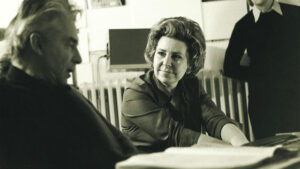


Comments